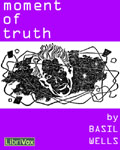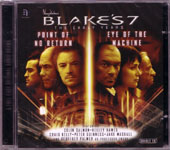
 Here’s another recent collection from the good people at LibriVox.org. I’ve made a few notes on just a few of these tales. Feel free to add your own as comments (we all should do more of that).
Here’s another recent collection from the good people at LibriVox.org. I’ve made a few notes on just a few of these tales. Feel free to add your own as comments (we all should do more of that).
So here are those notes: My listening of Faithfully Yours was slightly distracted, but from what I heard it was a pretty good tale. I’m going to have to listen to it one more time to come to any final judgments about it. Unfortunately many mispronunciations mar Blair Buckland’s reading of The Invaders – but, the story still works – it would make a great tale to re-record. The Next Logical Step, by Ben Bova, is a very solid cold war piece that feels rather more modern than its 1962 vintage would normally suggest. It has an almost cyberpunk feel with its VR computer equipment – and the ending is absolutely rock solid. It has a great title too!
 Short Science Fiction Collection Vol. 013
Short Science Fiction Collection Vol. 013
By various; Read by various
10 Zipped MP3 Files or Podcast – Approx. 4 Hours 31 Minutes [UNABRIDGED]
Publisher: LibriVox.org
Published: April 24, 2009
Science fiction (abbreviated SF or sci-fi with varying punctuation and case) is a broad genre of fiction that often involves sociological and technical speculations based on current or future science or technology. This is a reader-selected collection of short stories, first published between 1951 – 1962, that entered the US public domain when their copyright was not renewed.
Podcast feed: http://librivox.org/bookfeeds/short-science-fiction-collection-vol-013.xml
iTunes 1-Click |SUBSCRIBE|
 Faithfully Yours
Faithfully Yours
By Lou Tabakow; Read Gregg Margarite
1 |MP3| – Approx. 40 Minutes [UNABRIDGED]
Publisher: LibriVox.org
Published: April 24, 2009
If it’s too impossibly difficult to track down and recapture an escaped criminal … there’s a worse thing one might do…
From “Astounding Science Fiction” December 1955.
 The Golden Judge
The Golden Judge
By Nathaniel Gordon; Read by Hollis Hanover
1 |MP3| – Approx. 44 Minutes [UNABRIDGED]
Publisher: LibriVox.org
Published: April 24, 2009
A suggestion and a highly intriguing one–on how to settle the problems that involve face-saving among nations! From Astounding Science Fiction December 1955.
 The Invaders
The Invaders
By Benjamin Ferris; Read by Blair Buckland
1 |MP3| – Approx. 34 Minutes [UNABRIDGED]
Publisher: LibriVox.org
Published: April 24, 2009
Magic—there’s no such thing. But the crops were beginning to grow backwards… From Weird Tales March 1951.
 Moment Of Truth
Moment Of Truth
By Basil Wells; Read by Betsie Bush
1 |MP3| – Approx. 10 Minutes [UNABRIDGED]
Publisher: LibriVox.org
Published: April 24, 2009
“Basil Wells, who lives in Pennsylvania, has been doing research concerning life in the area during the period prior to and following the War of 1812. Here he turns to a different problem—the adjustment demanded of a pioneer woman, not in those days but Tomorrow—on Mars.” From Fantastic Universe December 1957.
 The Next Logical Step
The Next Logical Step
By Ben Bova; Read by Bill Ruhsam
1 |MP3| – Approx. 14 Minutes [UNABRIDGED]
Publisher: LibriVox.org
Published: April 24, 2009
Ordinarily the military least wants to have the others know the final details of their war plans. But, logically, there would be times— From Analog Science Fact & Fiction May 1962.
 Pandemic
Pandemic
By J.F. Bone; Read by Hollis Hanover
1 |MP3| – Approx. 45 Minutes [UNABRIDGED]
Publisher: LibriVox.org
Published: April 24, 2009
Generally, human beings don’t do totally useless things consistently and widely. So—maybe there is something to it—
From Analog Science Fact and Science Fiction February 1962.
 The Perfectionists
The Perfectionists
By Arnold Castle; Read by Betsie Bush
1 |MP3| – Approx. 32 Minutes [UNABRIDGED]
Publisher: LibriVox.org
Published: April 24, 2009
Is there something wrong with you? Do you fail to fit in with your group? Nervous, anxious, ill-at-ease? Happy about it? Lucky you! From Amazing Science Fiction Stories January 1960.
 Reluctant Genius
Reluctant Genius
By Henry Slesar; Read by Gregg Margarite
1 |MP3| – Approx. 6 Minutes [UNABRIDGED]
Publisher: LibriVox.org
Published: April 24, 2009
It is said that Life crawled up from the slime of the sea-bottoms and became Man because of inherent greatness bred into him before the dawn of time. But perhaps this urge was not as formless as we think. From Amazing Stories January 1957.
 Tight Squeeze
Tight Squeeze
By Dean Ing; Read by Gregg Margarite
1 |MP3| – Approx. 35 Minutes [UNABRIDGED]
Publisher: LibriVox.org
Published: April 24, 2009
He knew the theory of repairing the gizmo all right. He had that nicely taped. But there was the little matter of threading a wire through a too-small hole while under zero-g, and working in a spacesuit! From Astounding Science Fiction February 1955.
 We Didn’t Do Anything Wrong, Hardly
We Didn’t Do Anything Wrong, Hardly
By Roger Kuykendall; Read by Betsie Bush
1 |MP3| – Approx. 11 Minutes [UNABRIDGED]
Publisher: LibriVox.org
Published: April 24, 2009
After all—they only borrowed it a little while, just to fix it— From Astounding Science Fiction May 1959.
Posted by Jesse Willis

 Medal Of Honor
Medal Of Honor


 Blake’s 7 – Point Of No Return and Eye Of The Machine (Vol. 1.2 & 1.3)
Blake’s 7 – Point Of No Return and Eye Of The Machine (Vol. 1.2 & 1.3)

 Here’s another recent collection from the good people at LibriVox.org. I’ve made a few notes on just a few of these tales. Feel free to add your own as comments (we all should do more of that).
Here’s another recent collection from the good people at LibriVox.org. I’ve made a few notes on just a few of these tales. Feel free to add your own as comments (we all should do more of that).









